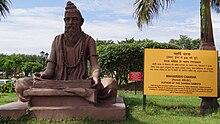Ayurveda (Sanskrit: Āyurveda , "life-knowledge"; English pronunciation /ˌaɪ.ərˈveɪdə/]) or Ayurvedic medicine is a system of traditional Hindu medicine native to the Indian subcontinent. Contemporary practices derived from Ayurvedic traditions are a type of alternative medicine.Ayurveda is a discipline of the upaveda or "auxiliary knowledge" in Vedic tradition. The origins of Ayurveda are also found in the Atharvaveda, which contains 114 hymns and incantations described as magical cures for disease. There are also various legendary accounts of the origin of Ayurveda, e.g., that it was received by Dhanvantari (or Divodasa) from Brahma. Ayurvedic practices include the use of herbal medicines, mineral or metal supplementation (rasa shastra), surgical techniques, opium, and application of oil by massages.
Originating in prehistoric times, some of the concepts of Ayurveda have been discovered since the times of Indus Valley Civilization and earlier Ayurveda significantly developed during the Vedic period and later some of the non-Vedic systems such as Buddhism and Jainism also are incorporated in the system. Balance is emphasized, and suppressing natural urges is considered unhealthy and claimed to lead to illness. Ayurveda names three elemental substances, the doshas (called Vata, Pitta and Kapha), and states that a balance of the doshas results in health, while imbalance results in disease. Ayurveda has eight canonical components, which are derived from classical Sanskrit literature. Some of the oldest known Ayurvedic texts include the Suśrutha Saṃhitā and Charaka Saṃhitā, which are written in Sanskrit. Ayurvedic practitioners had developed various medicinal preparations and surgical procedures by the medieval period.
Although laboratory experiments suggest it is possible that some substances in Ayurveda might be developed into effective treatments, there is no evidence that any are effective as currently proffered. Modern ayurvedic medicine is considered pseudoscientific.Other researchers consider it a proto-science, an unscientific, or trans-science system instead.Concerns were raised when 20% of Ayurvedic U.S. and Indian-manufactured patent medicines sold through the Internet were found to contain toxic levels of heavy metals such as lead, mercury, and arsenicThe central ideas of Ayurveda are primarily derived from Vedic
philosophy, although some concepts were later borrowed from similar
non-Vedic systems such as Buddhism and Jainism. Balance is emphasized, and suppressing natural urges is considered unhealthy and claimed to lead to illness.For example, to suppress sneezing is said to potentially give rise to shoulder pain.[30] However, people are also cautioned to stay within the limits of reasonable balance and measure when following nature's urges For example, emphasis is placed on moderation of food intake, sleep, and sexual intercourse.]
Ayurveda names seven basic tissues (dhatu), which are plasma (rasa), blood (rakta), muscles (māmsa), fat (meda), bone (asthi), marrow (majja), and semen (shukra). Like the medicine of classical antiquity, Ayurveda has historically divided bodily substances into five classical elements (Sanskrit [maha]panchabhuta, viz. earth, water, fire, air and ether.[6] There are also twenty gunas
(qualities or characteristics) which are considered to be inherent in
all substances. These are organized in ten pairs of antonyms:
heavy/light, cold/hot, unctuous/dry, dull/sharp, stable/mobile,
soft/hard, non-slimy/slimy, smooth/coarse, minute/gross, and
viscous/liquid.
Ayurveda also names three elemental substances, the doshas
(called Vata, Pitta and Kapha), and states that a balance of the doshas
results in health, while imbalance results in disease. One Ayurvedic
view is that a the doshas are balanced when they are equal to each
other, while another view is that each human possesses a unique
combination of the doshas which define this person's temperament and
characteristics. In either case, it says that each person should
modulate their behavior or environment to increase or decrease the
doshas and maintain their natural state.











